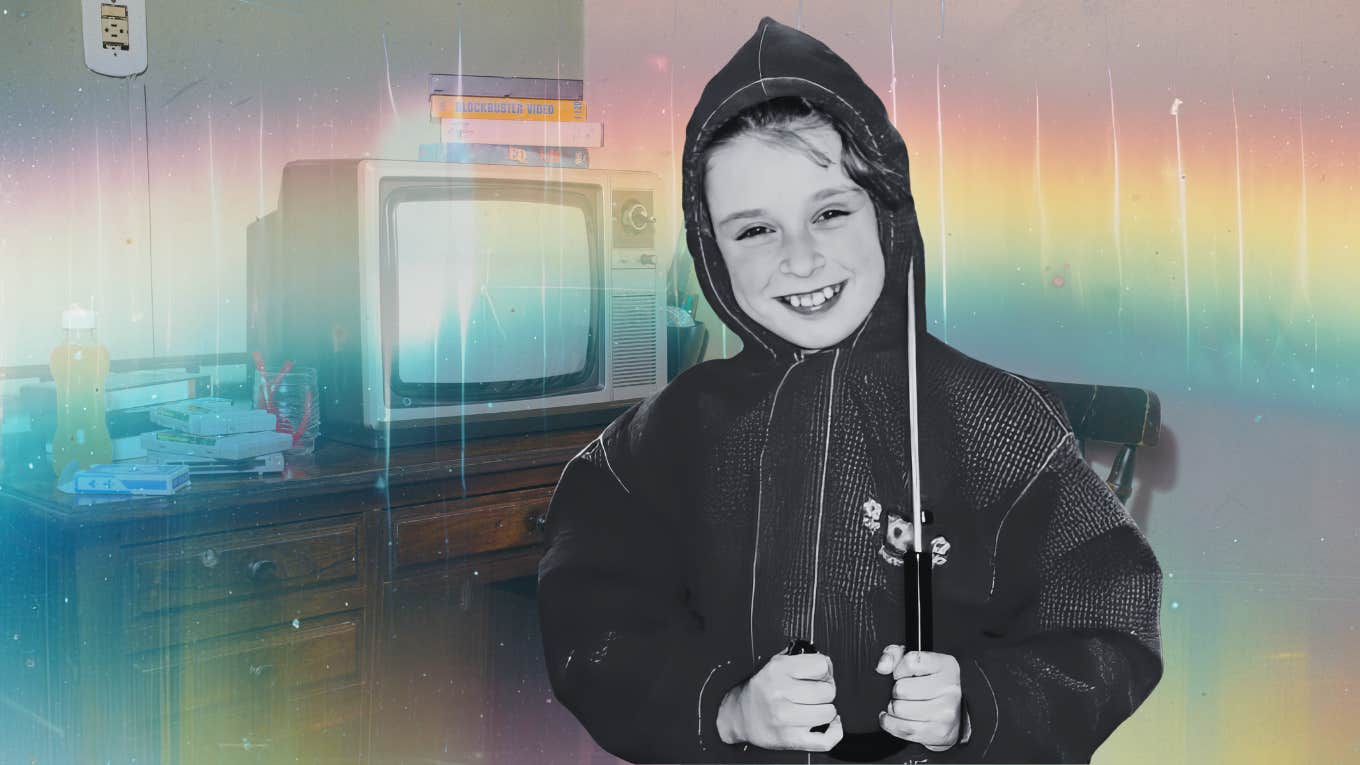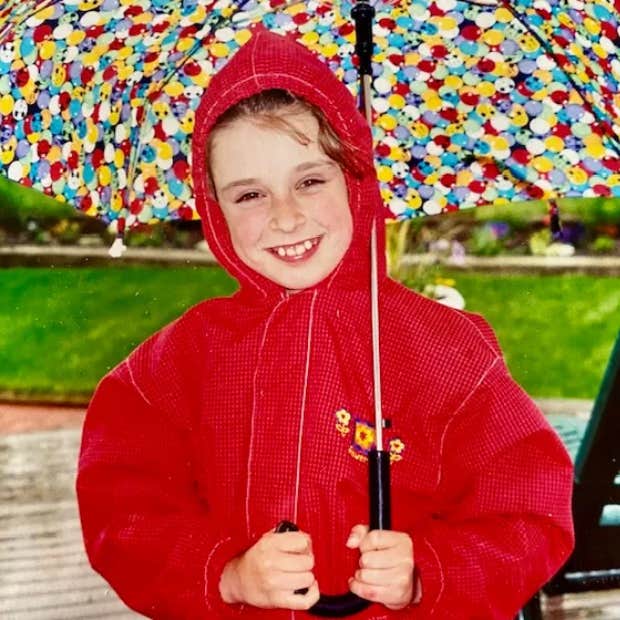When My 9-Year-Old Stopped Eating, I Was Shocked To Discover Why
My daughter was starving herself and refused to tell me the reason.
 Courtesy Of Author, Eliza Alves | Canva
Courtesy Of Author, Eliza Alves | Canva I always wanted children. It’s the one thing I never questioned. Even at sixteen, when my boyfriend and I started to become intimate and were not exactly careful, I daydreamed about what it would be like to be a mother. I’d see myself blissfully holding a swaddled babe, magically knowing how to care for her because isn’t that what nature intended? Don’t all mammals intuitively know how to take care of their young?
Boy, was I wrong. Although I managed to keep Amanda and the two children that followed alive, I can say unequivocally that child-rearing is not intuitive. It takes effort, self-awareness, time, attention, devotion, humility, patience, and most importantly, truckloads of love.
My firstborn, Amanda, was an only child for nine years. Not because I didn’t want more children, but because my first husband was a dud and there was no way I was going to parent additional offspring with anyone who wasn’t excellent father-and-husband material.
When I finally found husband number two, whom I believed to be the perfect man, we married quickly and moved to the suburbs with excellent schools. Sixteen months later, I found myself on all fours inside a baby pool staring at a pattern of Ninja Turtles birthing our baby at home. I was determined to do it right this time and believed with all my heart that Amanda would love to see her little sister or brother be born.
She did not.
She hid under the dining room table with fingers plugging her ears trying to block out the sounds coming from the bedroom. She was not interested in seeing her mother naked and, she told me many years later, would likely never have children after hearing me moan in pain.
What I had hoped would be a life-changing experience for my nine-year-old was, in fact, a life-changing experience, just not in the way I had intended.
Screw-up number two came when I believed Amanda would naturally love being the big sister; that she would dote on Emma, help me change diapers, beam with pride and adoration as she pushed the stroller through the neighborhood — in short, be goo-goo ga-ga over her baby sibling, the same way I was.
Wrong again.
Two months after Emma was born, Amanda started coming home from school with her lunches half-eaten. A few bites would be taken out of her ham and mustard sandwiches, strawberries came back untouched fermenting inside their plastic bags, and chocolate chip cookies would be pulverized into crumbs at the bottom of her lunch kit.
At first, I thought maybe she was tired of her favorites and switched things up a bit. Sun-dried tomato and deli turkey sandwiches with sliced apples. Oatmeal and raisin cookies. For a few days, she’d eat a little more and then go back to picking at her food.
For whatever reason, she didn’t toss the uneaten lunch into the trash but brought it home for me to find. When I asked why she wasn’t eating her lunches, her answer was the same every time. “I’m not hungry.”
Over the following weeks, she grew more sullen and withdrawn and spent most afternoons behind the closed doors of her room.
Every night, there seemed to be an argument about what was for dinner. She’d dissect the chicken with her knife, push the mashed potatoes to the side of the plate, and end up eating three peas she had painstakingly speared onto the prongs of her fork. “I’m full,” she’d declare. No matter what I prepared, she only ate a few bites.

Photo: Alexas_Fotos/Pixabay
I took her to the pediatrician. After a complete examination, he couldn’t find anything wrong with her and told me to stop worrying. “She’ll eat when she’s hungry,” he said and handed her a lollipop.
Christmas was upon us. With a new baby, a nine-year-old daughter, and a ten-year-old stepson, I became distracted with the preparations. There were Christmas cookies to be baked, gifts to be bought and wrapped, and Christmas cards written and sent off. I blocked out the half-eaten lunches and told myself Amanda was going through a phase. She’d start eating once she was at home for the Christmas break.
She didn’t.
In January, I picked up the printed photos we had taken over the holidays and while I waited in my car for Amanda to come out of school, stared at the pictures of her in disbelief.
How did I not see this before? My firstborn’s eyes were dull and underscored by dark smudges. Her normally round and rosy cheeks were sunken and her complexion ashen. From the sleeves of her dress, delicate wrists poked out and her legs were nothing more than match sticks.
I began to cry. It’s as though I hadn’t truly seen the effects of Amanda’s refusal to eat until they were staring back at me from the photographs. This was not normal! There was something very wrong with my child and I missed it.
The following day, I confided my worries to my mother. Although she was not the best parent to me, she had a way with her grandkids. She agreed to take Amanda for the weekend to find out why she wasn’t eating.
RELATED: How To Raise The Best Version Of Your Child — By Forgetting What You Know About Parenting
“She’s starving herself,” my mother said the following Monday, “because she believes the less she eats, the smaller she’ll get.”
We were sitting across from one another at Tim Horton’s cafe, Emma asleep next to me, still strapped into her car seat.
I shook my head, impatient. “But why?”
My mother paused for effect. “In her mind, this means that she’ll get as much attention from you as you give to Emma. It makes perfect sense if you look at it from the perspective of a nine-year-old.”
I started to feel the familiar fizziness inside my breasts. Since Emma was born, each time I felt emotional about my kids, my body did this weird thing and my boobs would start to leak milk. I placed my elbows on the table and applied pressure to my chest to stop the flow.
“She hates it when you call her your big girl,” my mother continued. “She doesn’t want to be reminded about how old she is on her next birthday. She just wants to be little again.”
As if on cue, Emma started to wail. I picked her up to nurse her. My heartbeat calmed right along with my baby's while my mother droned on about the things she and Amanda did over the weekend.
Part of me wanted to believe that Amanda was just being dramatic and difficult.
It’s how she got my attention. Our mother/daughter relationship had always been challenging.
I had been a single mom since she was two. There wasn’t much time to be an exemplary mother to her. I worked full-time. I dated. Our one-on-one time consisted of a bedtime story read in a hurry and a quick peck on her forehead. She didn’t get the attention she now saw me give to her baby sister. She got my dregs.
I naively thought that by being part of a pretend nuclear family with a stand-in father figure, a step-brother, and now a half-sister, she’d blossom. I thought she’d love living in a middle-class suburban neighborhood and attending a fancy catholic school. I assured myself she’d feel blissfully grateful, the emotional neglect she had experienced growing up all but erased.
It was easy to believe that’s all she needed to be happy. In reality, it’s what I needed — a stable home with a loving and dependable husband: safety and security and all that.
RELATED: 10 Signs You Were Emotionally Neglected As A Child
But Amanda wasn’t me.
She was a nine-year-old child desperate for her mother’s love and attention. She wanted the mom she didn’t get to have.
Shame rolled over me in waves. I flashed back on my childhood and how unhinged I had felt at eight years old when my sister was born. I adored her and at the same time, grew parched for my mother. After my sister showed up, the earth had tipped on its axes and everything suddenly became about her.
Overnight, I became my mother’s helper and stopped being a child. I faintly remember her saying that she didn’t realize how big I had gotten until she saw me next to my baby sister. I felt like an ugly giant and hated myself for it.
“…I told her,” my mother’s voice floated back in, “that her body is like a car. Without gas, it will stop running. I told her that food is like gas for her body. She needs to eat to keep going.”
I never told Amanda that I learned what she shared with her grandmother in confidence. What I did was decide to spend more time together, just her and I doing something special.
Over the next few months, I took the time to sit on her bed before she went to sleep and asked about her day. I kissed her forehead and told her I loved her. I let her choose an activity she wanted to do with just me.
I don’t recall how long this went on, but what I do remember is that eventually, the color seeped back into her cheeks, her eyes grew bright, and she slowly came back to herself.

Photo: Author's daughter, Amanda/Judy Walker
My oldest daughter is 32 now. There are moments when I still feel the echo of guilt scratch the inside of my ribcage. I wish I could have been the attentive full-time mother to her that I was to her younger siblings a decade later.
I wasn’t. I didn’t know how to be.
I’ve made amends to her several times over the years. I see the damage my emotional unavailability in her formative years has had on her self-image, the relationships she chooses, and how hard she finds it to love herself.
My daughter has taught me that even though we cannot go back to fix our parenting faux pas, we can forgive ourselves in the present, show up as our authentic selves, and love like there is no past, no future, only this one present moment.
RELATED: How To Tell If Your Kids Are Victims Of Childhood Emotional Neglect
Judy Walker writes about the gritty, lovely, naughty, and joyful bits of humanhood. She has written extensively for Medium and Elephant Journal.
